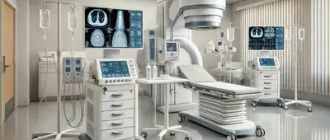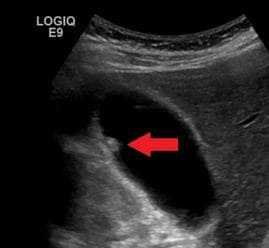Stomach cancer, also referred to as gastric cancer, is a cancer that starts in the cells that line the stomach. It is a fairly prevalent type of cancer, with numerous new cases detected globally each year. Stomach cancer can develop in any section of the stomach and has the potential to spread to nearby organs or lymph nodes as it advances.
Types of Stomach Cancer
There are several types of stomach cancer, including:
- Adenocarcinoma is the predominant form of stomach cancer, making up approximately 95% of all cases. It occurs when the glandular cells in the lining of the stomach undergo malignant growth.
- Lymphoma: Lymphoma is a cancer that begins in the immune system cells. It can involve the stomach and other organs.
- Gastrointestinal stromal tumor (GIST): GIST is a rare type of stomach cancer that develops in the cells of the stomach wall.
- Carcinoid tumor: Carcinoid tumors are slow-growing tumors that can develop in the stomach or other parts of the gastrointestinal tract.
Each type of stomach cancer has different characteristics and treatment options. It is important to consult a medical professional for an accurate diagnosis and personalized treatment plan.
Common Causes of Stomach Cancer
Stomach cancer, also known as gastric cancer, can develop due to various factors. While the exact cause is not always clear, certain common causes have been identified:
- Helicobacter pylori infection: This bacteria is known to increase the risk of developing stomach cancer. It can cause inflammation and damage to the lining of the stomach over time.
- Unhealthy diet: Consuming a diet high in salted, smoked, or pickled foods, as well as processed meats, can increase the risk of stomach cancer.
- Tobacco and alcohol consumption: Smoking and excessive alcohol intake have been linked to an increased risk of developing stomach cancer.
- Family history: Having a family history of stomach cancer or certain genetic conditions, such as hereditary diffuse gastric cancer (HDGC), can increase the risk of developing the disease.
Factors that Increase the Risk of Stomach Cancer
In addition to the common causes mentioned above, certain factors can further increase the risk of developing stomach cancer:
- Age: Stomach cancer is more common in older adults, typically over the age of 50.
- Gender: Men tend to have a higher risk of developing stomach cancer compared to women.
- Race: Stomach cancer is more prevalent among certain ethnic groups, such as Asians, Hispanics, and African Americans.
- Obesity: Being overweight or obese has been associated with an increased risk of stomach cancer.
- Pernicious anemia: This condition, which affects the absorption of vitamin B12, has been linked to a higher risk of stomach cancer.
Stomach Cancer Symptoms
Stomach cancer, also known as gastric cancer, is a serious condition that requires early detection and treatment. Understanding the symptoms associated with stomach cancer is crucial for early diagnosis and improving the chances of successful treatment. Here are some common symptoms of stomach cancer:
Early Symptoms of Stomach Cancer
- Indigestion and heartburn: Persistent indigestion and frequent heartburn that do not improve with over-the-counter medications may be an early sign of stomach cancer.
- Abdominal pain: Dull or persistent abdominal pain, especially in the upper abdomen, can be an early symptom.
- Feeling full after eating small amounts: If you constantly feel full even after consuming small meals, it could be an indication of stomach cancer.
- Nausea and vomiting: Frequent nausea, vomiting, or feeling sick after eating may be associated with stomach cancer.
- Unexplained weight loss: If you are unintentionally losing weight without making any changes to your diet or exercise routine, it might be a symptom of stomach cancer.
Advanced Symptoms of Stomach Cancer
- Blood in stool or vomiting blood: As stomach cancer progresses, it can lead to internal bleeding, which may cause blood to appear in your stool or vomit.
- Jaundice: Yellowing of the skin and eyes, known as jaundice, may occur if the cancer has spread to the liver.
- Difficulty swallowing: Advanced stomach cancer can cause difficulty swallowing, known as dysphagia.
- Fatigue and weakness: Ongoing fatigue and weakness, even without physical exertion, can be indicative of advanced cancer.
If you experience any of these symptoms, it is crucial to consult a healthcare professional for a proper diagnosis. Early detection of stomach cancer greatly increases the chances of successful treatment and improved outcomes.
For more information about stomach cancer and its symptoms, you can visit the American Cancer Society website.
Stages of Stomach Cancer
Stomach cancer is a serious disease that progresses through different stages. Understanding these stages can help patients and their loved ones grasp the severity and treatment options available. Here are the various stages of stomach cancer:
Stage 0: Carcinoma in Situ
At this stage, the cancer cells are only found on the surface of the inner lining of the stomach. They have not spread to deeper layers or nearby lymph nodes. Treatment is usually successful with surgery, and the cure rate is high.
Stage I, II, III: Localized and Regional Spread
In these stages, the cancer has grown beyond the inner lining of the stomach. It may have invaded nearby tissues or lymph nodes. The earlier the stage, the more confined the spread. Treatment options typically include surgery, chemotherapy, radiation therapy, or a combination of these treatments.
Stage IV: Metastatic Stomach Cancer
At stage IV, the cancer has spread to distant organs or lymph nodes. It may affect the liver, lungs, bones, or other organs. Treatment focuses on controlling the cancer’s growth, managing symptoms, and improving quality of life. This may involve chemotherapy, targeted therapies, immunotherapy, or palliative care.
| Stage | Signs and Symptoms | Prognosis |
|---|---|---|
| Stage 0 | – No symptoms | – Highly curable |
| Stage I | – Indigestion or heartburn – Mild nausea or vomiting | – Good prognosis – High survival rate |
| Stage II | – Blood in stool or dark stools – Unexplained weight loss | – Moderate prognosis – Lower survival rate |
| Stage III | – Abdominal pain – Fatigue or weakness – Difficulty swallowing | – Lower prognosis – Decreased survival rate |
| Stage IV | – Jaundice (yellowing of skin) – Severe weight loss – Spread to other body parts | – Poor prognosis – Low survival rate |
Diagnostic Tests for Stomach Cancer
Stomach cancer is a serious condition that requires prompt diagnosis and treatment. To determine if a person has stomach cancer, several diagnostic tests may be performed. These tests include:
- Endoscopy: A procedure that uses a long, flexible tube with a camera to examine the inside of the stomach.
- Biopsy: During an endoscopy, the doctor may take small tissue samples for laboratory analysis to confirm the presence of cancer cells.
- Imaging tests: Such as CT scans, X-rays, and ultrasound, can help identify tumors or abnormalities in the stomach.
- Blood tests: Certain blood tests can detect substances that may indicate the presence of stomach cancer.
- Genetic testing: In some cases, genetic testing may be recommended to determine if there is a hereditary component to stomach cancer.
Treatment Options for Stomach Cancer
Once a diagnosis of stomach cancer is confirmed, treatment options will be discussed with the patient. The choice of treatment depends on various factors, including the stage of cancer, the location and size of the tumor, and the overall health of the individual. Treatment options may include:
- Surgery: The primary treatment for stomach cancer involves removing the tumor and, in some cases, surrounding lymph nodes.
- Chemotherapy: Drugs may be used to destroy cancer cells before or after surgery, or sometimes as the primary treatment for advanced cases.
- Radiation Therapy: High-energy X-rays or other forms of radiation can be targeted at the tumor to destroy cancer cells.
- Targeted Therapy: This treatment option involves using drugs to target specific molecules or genes that contribute to the growth of cancer cells.
In many cases, a combination of treatments may be recommended to achieve the best possible outcome. Treatment plans are typically individualized and carefully tailored to the needs of each patient.
Prevention and Lifestyle Changes
Stomach cancer is a serious disease that can have a significant impact on a person’s health and well-being. Fortunately, there are steps that individuals can take to reduce their risk of developing stomach cancer. Here are some tips for preventing stomach cancer and adopting a healthy lifestyle to mitigate the risk.
Tips for Preventing Stomach Cancer
- Eat a healthy diet: Consuming a diet rich in fruits, vegetables, whole grains, and lean proteins can help reduce the risk of stomach cancer. Avoiding processed foods, excessive salt intake, and nitrate-rich foods like processed meats is also advisable.
- Avoid smoking and excessive alcohol consumption: Smoking and heavy alcohol consumption have been linked to an increased risk of stomach cancer. Quitting smoking and moderating alcohol intake can significantly reduce the risk.
- Practice food safety: Proper food handling and storage can help prevent infections with bacteria like H. pylori, which can increase the risk of stomach cancer. Wash hands thoroughly, cook foods to appropriate temperatures, and avoid consuming contaminated food or water.
- Stay physically active: Regular exercise has been associated with a lower risk of various cancers, including stomach cancer. Aim for at least 150 minutes of moderate-intensity activity or 75 minutes of vigorous activity each week.
Healthy Lifestyle Changes to Reduce the Risk of Stomach Cancer
- Maintain a healthy weight: Obesity is a risk factor for stomach cancer. Adopting a healthy diet and engaging in regular physical activity can help achieve and maintain a healthy weight.
- Get vaccinated: The Helicobacter pylori (H. pylori) vaccine can help reduce the risk of stomach cancer associated with this bacterial infection. Consult with a healthcare professional about vaccination options.
Living with Stomach Cancer
Receiving a diagnosis of stomach cancer can be overwhelming and challenging to cope with. However, there are ways to navigate this journey and find support along the way. Here are some essential tips for living with stomach cancer:
Coping with Stomach Cancer Diagnosis
- Seek Emotional Support: It is crucial to reach out to loved ones, friends, or support groups to share your feelings and concerns. Talking to others who have gone through a similar experience can provide comfort and valuable advice. If needed, consider seeking professional counseling or therapy to help cope with the emotional challenges that come with a cancer diagnosis.
- Educate Yourself: Learning about stomach cancer, its treatment options, and potential side effects can help you become an active participant in your care. Stay informed by reading reputable resources, consulting your healthcare team, or joining educational programs offered by cancer organizations.
- Maintain a Healthy Lifestyle: Eating well-balanced meals, staying physically active, and getting enough rest are essential for supporting overall health during cancer treatment. Your healthcare team can guide you on dietary recommendations and suitable exercises for your condition.
Supportive Care and Resources for Stomach Cancer Patients
- Support Groups: Joining a support group can provide a sense of community and understanding. Connecting with other stomach cancer patients or survivors can offer valuable insights, emotional support, and inspiration throughout your journey.
- Patient Advocacy Organizations: Numerous organizations specialize in providing resources, support, and advocacy for cancer patients. These organizations work to improve awareness, research, and access to treatment options. Consider reaching out to organizations such as the American Cancer Society or the Stomach Cancer Awareness Network for assistance.
- Clinical Trials: Participating in clinical trials can provide access to cutting-edge treatments and contribute to advancing medical knowledge. Discuss with your healthcare team about any ongoing trials that may be suitable for you.
Facing the difficulties of living with stomach cancer can be tough, but with a strong support system, staying educated, and prioritizing your overall health, both physically and emotionally, you can confront these challenges with inner strength and optimism. It is important to acknowledge that everyone’s experience with stomach cancer is individual, and there are various resources accessible to assist you throughout your journey.
About the Author
Reyus Mammadli is the author of this health blog since 2008. With a background in medical and biotechnical devices, he has over 15 years of experience working with medical literature and expert guidelines from WHO, CDC, Mayo Clinic, and others. His goal is to present clear, accurate health information for everyday readers — not as a substitute for medical advice.







